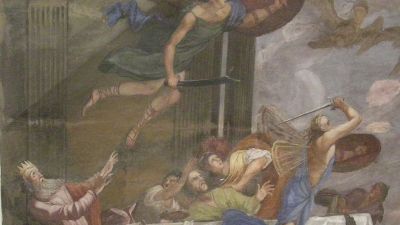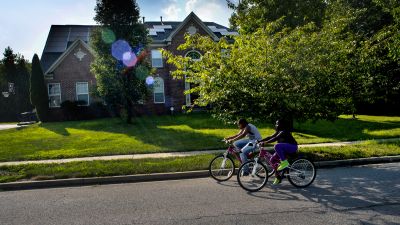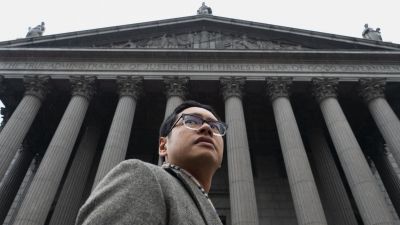The Force is a gripping documentary about the Oakland Police Department as it tries to implement a number of court-mandated reforms while anger over police brutality erupts in the city’s streets.
It’s the second film in director Peter Nicks’ trilogy looking at public institutions in Oakland, California. His first film, The Waiting Room, chronicled an Oakland emergency room and was short-listed for an Oscar.
The Oakland Police Department has a history of misconduct. Since 2003, it has been under a federal court order to eliminate racial profiling and reduce shootings involving police officers. But the reform efforts had stalled until 2014 when Sean Whent was named chief of police.
The film follows a new class of young recruits as the department prepares them to face the reality of policing the city’s streets. In the first half, the department is doing the right things — having hard conversations about accountability and racism and grappling with the history of police misconduct that has so poisoned relations with the community. In a particularly gripping scene, two young recruits heatedly debate whether shooting someone 13 times is considered excessive force.
After Nicks began filming, a grand jury failed to charge Ferguson, Missouri police officer Darren Wilson, who shot and killed unarmed teenager Michael Brown. As angry protesters spill into the streets of Oakland, the department is forced to reckon with their own police-related violence.
The film is told from the point of view of officers, finding a way to humanize them but not make excuses for their behavior. It shows the gripping tension and hair-trigger pressure that can occur when police come in contact with the community. While a sex scandal, not a shooting, ultimately brought down the department, it does raise the question of why police reform is so difficult. To which the film offers no easy answers.
Nicks spoke to me about The Force, his personal challenges in filming the documentary and the dueling narratives that emerge in the film. This interview has been lighted edited for clarity.
Titi Yu: You were originally in Oakland to film the police department implementing their reform efforts. Can you tell me a little bit about the reforms?
— Peter Nicks
Peter Nicks: We began the process before Black Lives Matter was even a hashtag. And so the original concept was to go inside a police department when there was a national conversation happening around this issue of accountability and see what this department was trying to do to address that. What you see in the film is roughly what they went through in this two-year period. And of course in the midst of all that Ferguson erupted, and Black Lives Matter emerged here in Oakland. And so we ended up capturing that as well. But the department had become a national model. The numbers of officer-involved shootings are way down in the three years we were engaged with them. There were a number of successes the department was achieving.
TY: In the beginning of the film, you see a police unit that was doing everything right. They were having the hard conversations about race, accountability, etc. And you think, oh they are doing the right things. But it ended in a spectacular implosion of the department in a sex scandal. What do you think happened there? Do you think these reform efforts missed something?
PN: No. I think scandals are a permanent part of the human landscape. Moral failure manifests itself in any number of situations. Human beings are in a constant process of failure and reform. What the film is really trying to point out is this institution is surrounded by so much darkness. The police are surrounded by drugs, sex trafficking and violence on a day-to-day basis. They become more susceptible to both individual sorts of failures and also institutional failures.
So what it really raises is the role of oversight. Whether that’s at the federal level as represented by federal oversight, or takes the form of civilian commissions that have some power over local police departments, which was voted in in Oakland. The film raises the question about the role these mechanisms have to address what is really an inevitable human failure. And the Justice Department and Jeff Sessions is saying right now that they want to roll back that type of oversight.
We are asking the audience to hold two truths simultaneously — that the reforms that were made were real and lasting. The fact that these officers were found to have raped this girl does not negate the progress that they made in an entirely different area. That really was speaking more to issues of race. It was difficult for us as filmmakers to have the film go to that place because it was a surprise and a shock to us. And it was an editorial challenge of how to offer it up to the audience.
TY: How did things change after Ferguson?
PN: It was a difficult process for me being a black filmmaker. I am a sort of member of this community stepping out of police cars amidst protests and getting treated with a lot of hostility and extreme prejudice by people within the community wondering who I was.
TY: Because you were following police officers?
PN: Yes. You know, the fight for justice now has taken on a tone that leads to intolerance. It’s like us versus them, it’s black or white, and as a filmmaker stepping into that space saying we’re going to allow both sides their voice. We are so emotionally engaged in these issues and it creates a very difficult environment for people to accept alternate perspectives and points of view. But that’s what we tried to do. We went in there aggressively open-minded, not promising anything thing to the Oakland Police Department, but it was originally meant to be much more from their perspective. A film about the police trying to reform. I think it shifted after Ferguson and we did represent some of the protest community in the film.
TY: Mayor Libby Schaaf said that the police department has a “toxic, macho culture.” Do you agree with her assessment of police culture based on what you saw?
— Peter Nicks
PN: Absolutely. The mayor described it as a macho culture because in police’s minds it’s necessary for survival and then it just bleeds out into other ways. It’s like a disease. What you saw there in the film, it doesn’t mean that there aren’t good things happening and there aren’t reform-minded leaders and individual officers. There are. That’s what we saw and that’s what we represented in the film.
TY: How has the film been received by the activist community?
PN: Not particularly well because a lot of people in the activist community are very focused on one narrative, which is the evils that the police do, and trying to root them out and expose them and bring account accountability. So there’s not a lot of tolerance for showing a cop in a three-dimensional way. Even though the film is a crushing indictment of the Oakland Police Department it still gets criticized. And we recognize that. But still as a filmmaker who has certain values and certain history, personally it’s frustrating to step into a space with people who are not willing to listen to you. On the other hand, we were surprised by the progress of this department. And saying these two things back to back will upset people greatly.
TY: Do you think there is a solution here, do you think the two sides can come together to have a conversation?
— Peter Nicks
PN: In smaller venues, yes. And I’ve had conversations with activists individually. It’s the problem when you get into groups of people. The performance aspect sort of kicks in and you lose the nuance, you lose the personal connection. There’s been a lot of stereotyping going on on both sides and a lot of disconnection from true understanding. And that’s a difficult thing.
Does a cop have the potential to take someone’s life unnecessarily because of implicit bias or racism? Yes, we think we’ve demonstrated that. The problem is you cannot determine who that is. And it’s very difficult for the justice system to sort that out.
And so what we’re going toward is not being willing to give anyone the benefit of the doubt. And I think there’s an impasse — we’re stuck. Until the justice system becomes more adept at rooting out and holding police officers who abuse their power accountable, there’s going to be no coming together. I don’t see that.
That doesn’t mean we don’t continue to tell our stories. We try to let people understand here’s what a cop has to deal with in everyday life. It’s a difficult job. They’re facing choices that are hard for you to understand.
On the flip side, there is a community story. If you’re a cop, you have to understand that there’s a deep narrative here. The community may feel a videotape is doctored because of things that have happened in the African-American community that goes back to slavery. So I think both sides need to hear that.
We need to keep working at reform and reforming the broader justice system. But also trying to figure out better ways to train cops. But I’d like to tell everybody that you can train the heck out of a recruit, but eventually they get to face the real world. Right? And that’s a world where we don’t have adequate access to health care, to education. We have young people on probation trying to graduate high school. It’s not a good recipe for cops to have to face the failures of our social and public institutions. It places too much burden on them.
And that’s why we’re doing the trilogy here. These public institutions are all connected.



